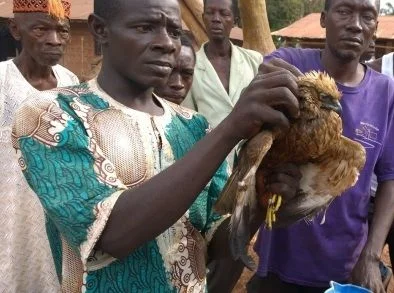Dutch Marsh Harrier killed in Sierra Leone
0f70dc8e-ff64-4782-b489-e44a0550f2a6

A Dutch Marsh Harrier has inadvertently raised greater awareness of migratory birds for locals in Sierra Leone after being killed by a hunter.
A farmer called Sullay Kanu who lives in Komrabai mabela, Kolifa Mabang Chiefdom, Tonkolili District, northern Sierra Leone captured a Marsh Harrier on his farm on 7 February 2014, with a locally made snare. The rope of the snare was made from materials they found from palm frond which they process locally to catch birds. The farm is on a flood plain with pools that contain fish and some amphibians, ideal habitat for the species when wintering in sub-Saharan Africa.
Despite efforts by the Conservation Society of Sierra Leone (CSSL, BirdLife in Sierra Leone) to get the Dutch-ringed bird released, the hunter refused as he believed he would get money for the bird, perhaps more than US$ 100. On 8 March 2014, Papanie Bai-Sesay and Geoffroy Citegetse of CSSL made a trip to the site to release the bird, but by then the bird was dead. According to the hunter, the bird died the same morning, so they collected the rings and tags for the sake of record keeping.
Interviews with hunters and local people shows that they kill birds for food and sometimes sell them to others in the same village or other villages. They alleged that the bigger species fetch up to the equivalent of US$ 11.40 each.
Sierra Leonean farmers hunt birds for various reasons – some to protect their farms and livelihoods, some for food, some for money and some for secret society ceremonies in traditional Poro and Bondo societies; Great Blue Turaco feathers are particularly prized for these rituals.
Where the harrier was caught, the locals were made aware by the CSSL workers of the importance of birds and their relationships with humans. The hunter said he understood and agreed that to take better care of the birds and also make other aware.
To deal with the idea that the birds would destroy farms, the CSSl say that they will plan a meeting with local people in the near future to answer direct questions, and hopefully inspire to a more sustainable approach.
A farmer called Sullay Kanu who lives in Komrabai mabela, Kolifa Mabang Chiefdom, Tonkolili District, northern Sierra Leone captured a Marsh Harrier on his farm on 7 February 2014, with a locally made snare. The rope of the snare was made from materials they found from palm frond which they process locally to catch birds. The farm is on a flood plain with pools that contain fish and some amphibians, ideal habitat for the species when wintering in sub-Saharan Africa.
Despite efforts by the Conservation Society of Sierra Leone (CSSL, BirdLife in Sierra Leone) to get the Dutch-ringed bird released, the hunter refused as he believed he would get money for the bird, perhaps more than US$ 100. On 8 March 2014, Papanie Bai-Sesay and Geoffroy Citegetse of CSSL made a trip to the site to release the bird, but by then the bird was dead. According to the hunter, the bird died the same morning, so they collected the rings and tags for the sake of record keeping.
Interviews with hunters and local people shows that they kill birds for food and sometimes sell them to others in the same village or other villages. They alleged that the bigger species fetch up to the equivalent of US$ 11.40 each.
Sierra Leonean farmers hunt birds for various reasons – some to protect their farms and livelihoods, some for food, some for money and some for secret society ceremonies in traditional Poro and Bondo societies; Great Blue Turaco feathers are particularly prized for these rituals.
Where the harrier was caught, the locals were made aware by the CSSL workers of the importance of birds and their relationships with humans. The hunter said he understood and agreed that to take better care of the birds and also make other aware.
To deal with the idea that the birds would destroy farms, the CSSl say that they will plan a meeting with local people in the near future to answer direct questions, and hopefully inspire to a more sustainable approach.

